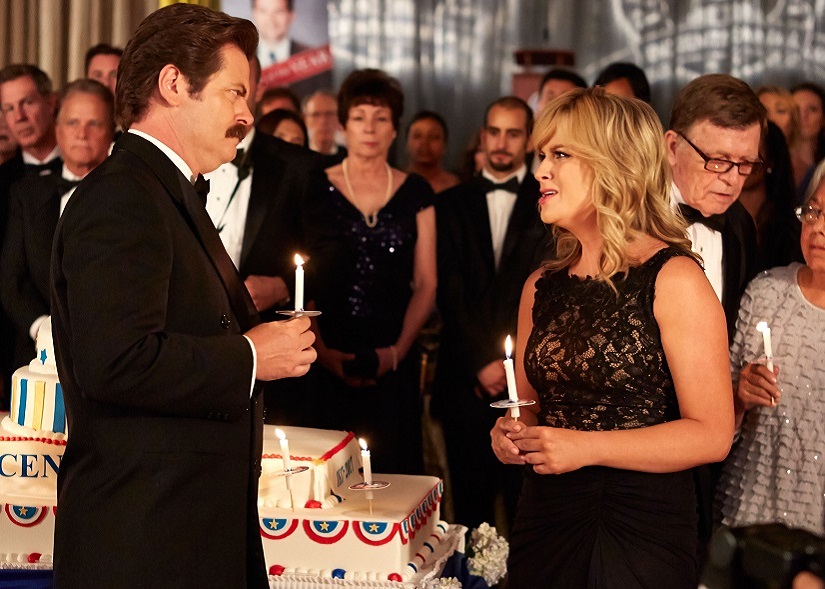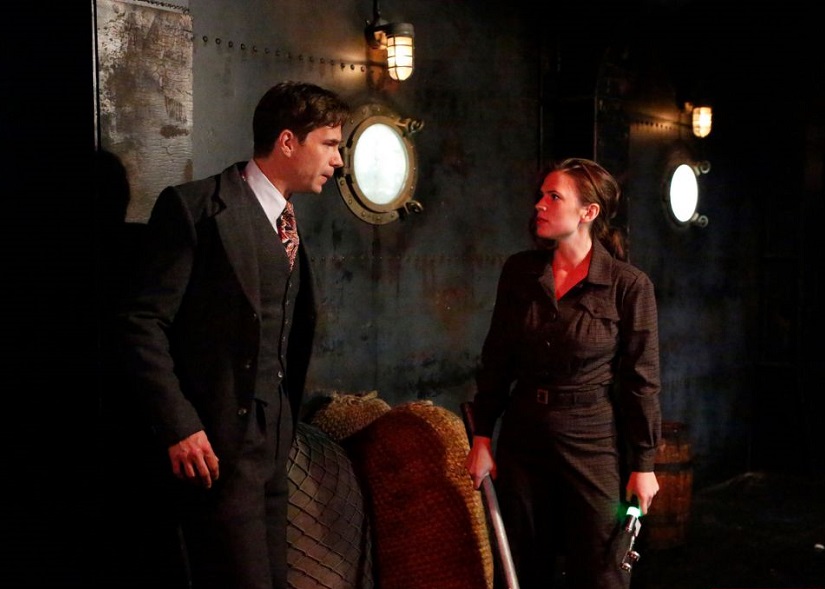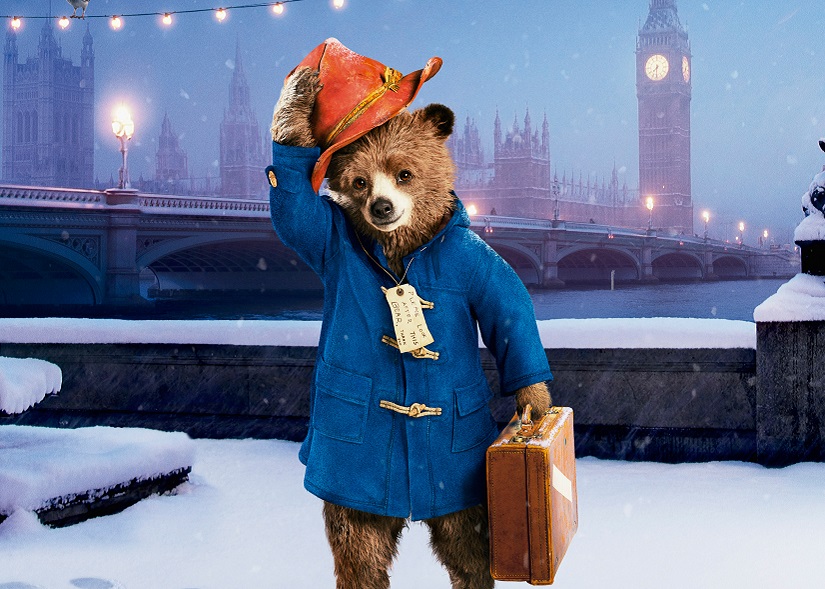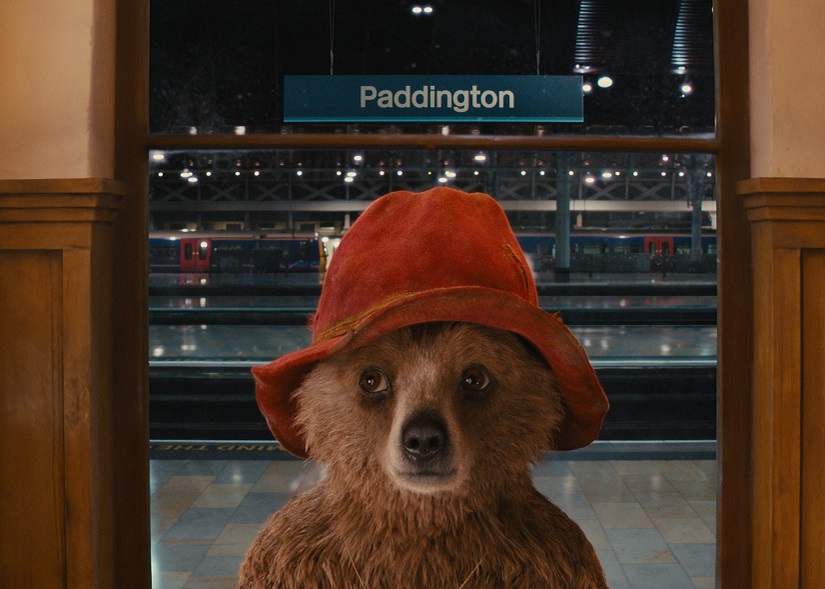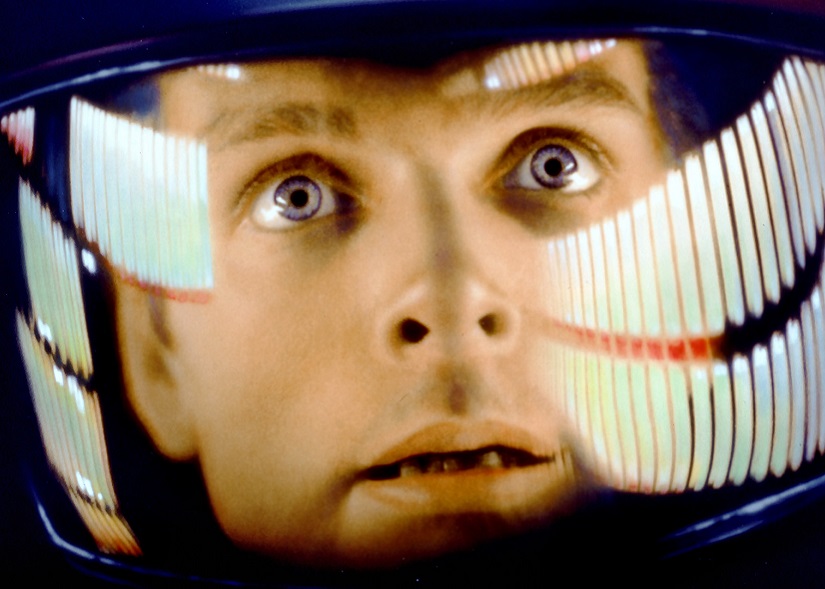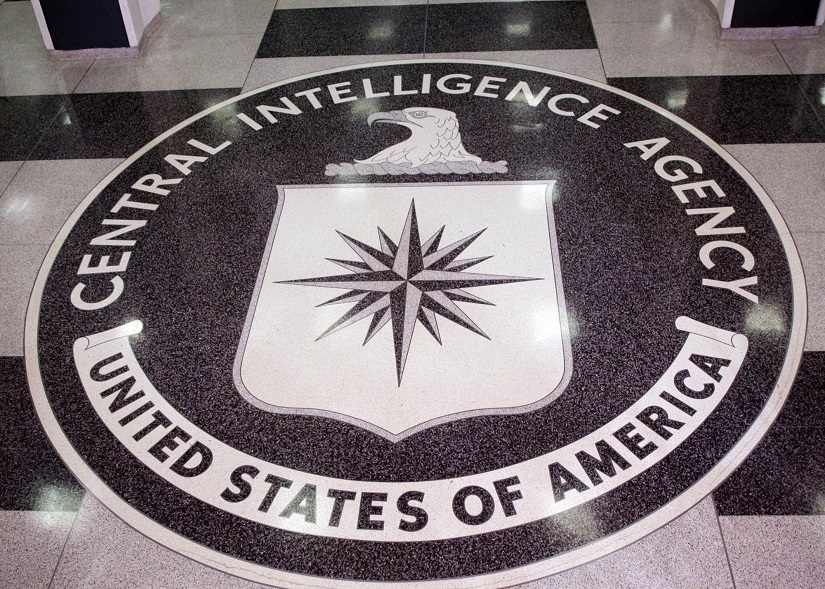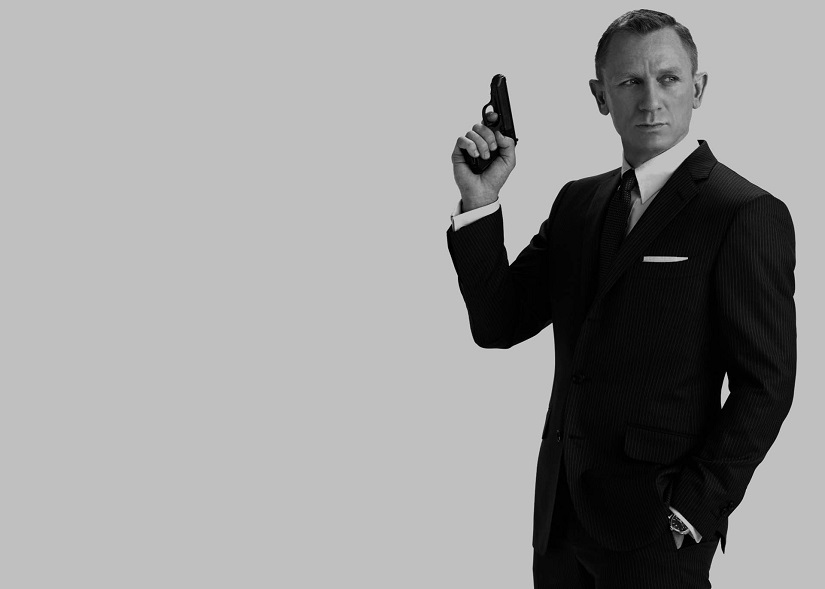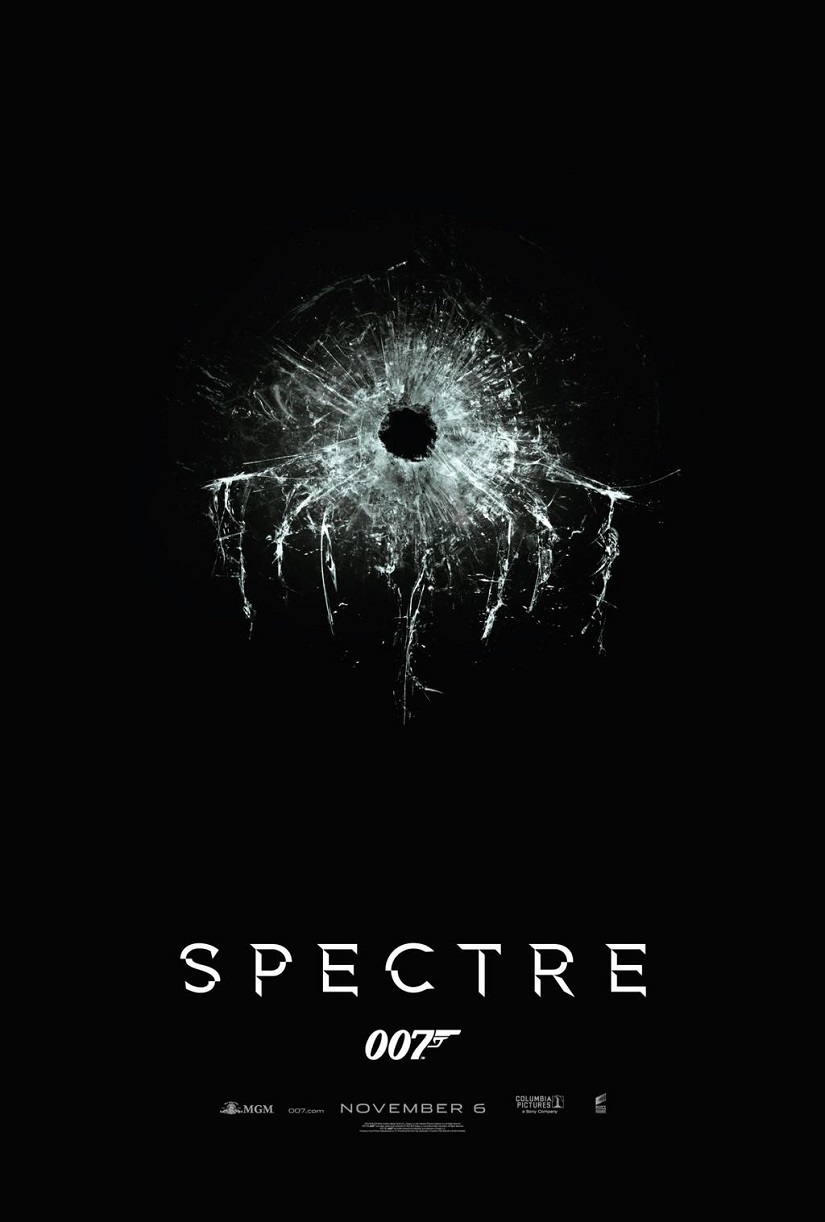[This Week in TV] Parks and Recreation, Agent Carter, Girls, Bob's Burgers
This Week in TV is a new weekly feature reviewing the best, worst and most interesting episodes of television from the past seven days. The plan is to cover a wide variety of shows, but not always the same ones each week, so let us know in the comments which ones you'd particularly like to read about. This week sees Parks and Recreation return for its final season, Lena Dunham's Girls make its fourth season debut, Hayley Atwell continue to kick ass in fabulous period clothing in Agent Carter and cult animation Bob's Burgers hit a season high point.
Parks and Recreation - "2017"/"Ron & Jammy": Parks and Rec threw quite the curveball into its final season with the reveal it would be taking place two years into the future in a growing and more prosperous version of Pawnee, a city formerly known for its slogan: 'First in friendship, fourth in obesity'. Aside from artificially intelligent tablets which may or may not wish to steal their owners' skin - just be sure to turn it off at night - the sci-fi trappings are kept firmly on the down-low, a sensible decision which nevertheless make the show's leap forward in time feel less consequential than might have been imagined.
The biggest change is that Leslie and Ron have had a big falling out over a project called Morning Star, the details of which are not disclosed. The two obviously haven't seen each other in a while when they come face to face mounting competing bids for a vast swath of parkland which Ron, who now runs a development company, wishes to commercialise, while Leslie intends to turn into a national park. Their animosity never feels particularly shocking or serious because their reconciliation and Leslie's success in turning the land into a park feel so inevitable. Even if the producers do throw in a late game twist, nothing here suggests that's likely and at the end of 'Ron & Jammy', the old friendship is already on its way to being rekindled.
Nevertheless, while Parks is a long way from its S2/3 pinnacle, it is still capable of delivering a steady supply of laughs, of which Jon Hamm's cameo early in "2017" is perhaps the biggest and most unexpected ("He's very stupid."). Aziz Ansari's silky bluster as Tom continues to be a goldmine of easy laughs, particularly when set against Adam Scott's desert-dry incredulousness as Ben: the sight of the pair of them breaking down in tears at Tom's real introductory speech for Ben's award (having previously hijacked the moment for self-promotion) was magnificent proof of how well the two actors work together. Ben is one of television's best anchors for larger than life characters, which also made his scenes with the unhinged Joan Calamezzo an additional treat.
Megan Mullally's Tammy ("She's here...") is another who never fails, in no small part since she's usually reserved to a single appearance per season, preventing fatigue from settling into what is essentially a one-joke character. Fortunately it's a very good joke and Mullally continues to play the hell out of it, particularly in her deranged disrobing in the library and the staff's total indifference to what was going on. Meanwhile, a dreary Andy and April subplot was salvaged by the appearance of Werner Herzog (naturally), making 'Ron & Jammy' an episode where the guest stars very much stole the show.
Girls - "Iowa": Girls picked up where it left off last season in story and tone, representative of a show confident in its voice if unlikely to win over any of its haters anytime soon. For the record I'm a fan, and it continues to amuse no end how the show's detractors persist in complaining that its biggest flaw is Lena Dunham supposedly presenting herself as 'the voice of her generation' despite the fact that, in the throughly insecure and self-absorbed Hannah, she's clearly enjoying dismantling the idea of anyone heaping such pretentious accolades upon themselves.
Nevertheless, Hannah is enjoying some success, having been accepted to a writers' school in Iowa following a successful stint writing for a magazine last season. The opening dinner scene between her and her parents is very funny, a back-and-forth of barbed compliments and put-downs. Meanwhile, Adam's burgeoning acting career is proving rife with creative frustrations - a hilariously terrible depression meds commercial he's starring in has apparently had all the best story bits edited out - and Marnie's trainwreck of a life continues to be as gratifying as ever. She starts off well enough, getting her salad tossed by her bandmate, with whom she's having an affair, but it's all downhill from there until she's being heckled off-stage in tears by an unimpressed child. Superb.
Once again, Dunham continues to show little idea of what to do with Shoshana or Jessa, despite both being amusing enough in their limited appearances. We meet Shosh's parents, who are every bit as terrible as expected, while Jessa calling Hannah out on the hypocrisy of pursuing her dreams outside New York is a clear cover for her own inability to find any sort of stability in her life.
Marvel's Agent Carter - "Time and Tide": Agent Carter got off to a solid if not especially substantial start last week with two episodes providing plenty of excitement and a charismatic central performance from Hayley Atwell, but not much beneath the surface. The third episode slows things down a little, offering a more in-depth look at the double lives of its central characters. Peggy continues to struggle to keep her investigations secret and one step ahead of her employers at SSR (Strategic Scientific Reserve), the cost of which is also taking its toll on her personal life. Another colleague turns up dead by the end of the episode and while Peggy wasn't as close to him as to her murdered roommate Colleen last week, the guilt still weighs heavily on her shoulders. The closing shot of her sitting at the bar, about to confide to a very limited extent to Angie, was nicely representative of distance she's forced to maintain even among those she'd like to call friends.
Meanwhile, we also learn a little more about Jarvis' past. Peggy is distraught to discover that even he has secrets, having narrowly avoided being charged with treason after being kicked out of the British army for forging a general's signature to save his Jewish wife during WW2. It's a welcome shot of depth for a character who has previously been little more than an amusing caricature, but diminished by the decision to keep Mrs. Jarvis off-screen, robbing the revelation of any emotional weight without a face to put to the name. It also feels as though Jarvis disclosed the full story a little too soon, where it might have made his relationship with Peggy a little livelier had he held out on his initial reticence for an episode or two.
As for the wider plot arcs, we learn how Stark's technology was stolen, which never feels any more substantial than time wasted on an acilliary detail, and the reveal that the symbol teased last week was pointing towards the ship where the stolen goods were being stored was a fairly limp payoff. Leviathan continues to be little more than a threatening name for anyone without comic foreknowledge, but the mysterious female assassin who kills Krzeminski is made slightly more interesting by a new girl, Dottie, moving in next door to Peggie in her weirdly conversative housing block. The action scenes are effective, if over-edited, and Carter continues a much stronger push out of the gate than Agents of S.H.I.E.L.D. managed but could still do with shifting up a gear or two if it is ever to fulfil its great potential.
Bob's Burgers - "Speakeasy Rider": After an inconsistent fourth season, Bob's Burgers has been steadily finding its feet again in recent weeks and following in the footsteps of the wonderful "Tina Tailor Soldier Spy" and 'Midday Run', 'Speakeasy Rider' suggests a show getting back to its best. It's a great sign of how strong the supporting cast is that so many characters could return for this one episode, whether in cameos (Critter and Mudfap from S3's "Ear-sy Rider") or more prominent roles (Bryce from "Full Bars", health inspector Hugo and Mr. Fischoeder), and feel welcome and familiar despite having been absent for so long. Hugo, in particular, was wonderful to have back and his frustrated antagonism makes him one of Bob's most enjoyable opponents. His job makes him a serious threat to the restaurant, but blinding insecurity and the ridiculousness of his demands (opening at 6am) make him delightfully unpredictable and ridiculous.
None of the plots had any great stakes, with Bob's speakeasy always feeling half-hearted and Gene's interest in flag waving even less than that, but the charisma between the leads and returning supporting characters (Louise to Mr. Fischoeder: "I missed you, where've you been?" "Oh... around.") elevated the dialogue to terrific heights. The episode's focus was always on the conflict between Tina and Louise in the go-kart league and while it was fun to see Tina confronting her sister for a change, it was a shame that she had to be the one to make the conciliary gesture at the end. On the one hand, it's definitely in character, but it still would've been nice for Louise to acknowledge in some way that she sometimes takes unfair advantage of her sister's malleability. Still, the racing scenes were a lot of fun and Bob and Linda turning up to watch the climactic showdown was as great as it always is when the Belcher parents realise what unsupervised adventures their children have been off having on their own, only to shrug and turn out to support them anyway.
[Review] Paddington
If you've heard of Paddington, it's probably thanks to the 'creepy Paddington' meme which popped up following the movie's ill-received first trailer. There's no denying that Paddington looks a bit uncanny valley thanks to CGI which isn't always up to the expected modern standard, but it would be a great shame were it to put people off seeing the movie, which unexpectedly proves one of the funniest and most charming family releases in some time.
Big screen adaptations of beloved childhood stories and characters have not traditionally gone well outside a few happy exceptions, and those familiar with Michael Bond's sweet but slight series of books and the 1975 series of 5-minute shorts (easily found these days on YouTube) would have good reason for doubing whether the material was a suitable fit for extending to feature length. Those doubts are quickly dispelled by the movie getting its first big laugh within a minute of starting, riffing on the Victorian trope of the gentleman explorer in an opening which amounts to a sort of reverse Up!. It establishes the tone neatly and concisely, allowing the gags and set-pieces to build on each other and create a nicely balanced comic rhythm that gives the best jokes enough time to stand out and discarding weaker material before it can become a problem.
[youtube id="7bZFr2IA0Bo"]
Paddington
Director: Paul King
Rating: PG
Release Date: January 16th 2015
King puts to good use his previous experience as director on cult surrealist comedy The Mighty Boosh to good use in creating a London at once familar but fantastical, enlivened by bold colour contrasts and a keen eye for bringing out the character of each area of the city. As the story of a young bear who travels to the big city in search of a new home, Paddington wears its themes about immigration and integration on its sleeve, revelling in the flavours and textures of an urban melting pot of cultures and ethnicities bound by a very English affection for the eccentric. It's a wonderfully inclusive portrayal which doesn't preach, but instead offers an arresting vision of the best possible version of what such a city could look like. It is just about the most English thing you'll ever see, right down to an entirely positive delight at cross-dressing humour, which inexplicably earnt the movie a higher age rating and proved the censors less open-minded than the movie they were assessing.
That eternal positivity is what defines Paddington more than anything else. Despite one early misstep, caving to the misconception that children's movies are seemingly obligated to have at least one sad thing happen, the movie's refusal to surrender itself to cynicism or sneering irony is a welcome relief. Pop culture references are few and far between, with the only really prominent one a visual gag played to absolute perfection in the final act, and even the threat of Nicole Kidman's villainous taxidermist is played almost entirely for laughs, right down to her receiving a beautifully humiliating comeuppance.
Paddington himself is a perfect translation of Michael Bond's creation, curious and clumsy but polite and well-intentioned to a fault. The CGI may be a bit wonky at times - a frankly terrifying CGI chihuahua turns up halfway through - but does good work visually conveying the character's personality, matched by Ben Whishaw's immediately winning vocal work. On the human side, anyone who has seen Happy Go Lucky will know Sally Hawkins' ability to radiate pure wide-eyed joy, put to wonderfully sweet and funny use as the free-spirited matriarch of the Brown family. Hugh Bonneville of Downton Abbey plays her officious husband (graceful writing makes it clear why and how much they love each other, despite the gulf in personalities) and gets no shortage of opportunities to put his gift for straight-faced humour to excellent use. Even the Brown family children are sufficiently well-drawn to be ingratiating rather than grating, and while Julie Walters and Peter Capaldi are sadly not given enough to do despite their valiant efforts, there are strong cameos from Matt King (Super Hans from Peep Show) and Jim Broadbent in particular as a kindly antique shop owner with a love of train sets and afternoon tea.
Paddington is one of those rare movies which comes out of nowhere to prove a complete joy. From its boundless enthusiasm for a perfectly timed bear pun - including a sat-nav joke which still makes me laugh just to remember it - and relentless optimism in people's essential good natures and ability to form bonds with even the unlikeliest of strangers, it is childish in all the best ways and sufficiently confident in its tone not to need to segregate its humour between younger and older viewers. 2015 got off to a bleak start in the real world, making Paddington a welcome infusion of unapologetic joy and silliness in dark times.
Romanticism vs Enlightenment in 2001: A Space Odyssey and Interstellar
2014 has been a great year for sci-fi. Guardians Of The Galaxy proved one of Marvel's biggest hits to date despite starring little known characters and lacking a big star name among the cast; Luc Besson's affably bonkers Lucy and Jonathan Glazer's chillingly impenetrable Under The Skin saw Scarlett Johansson build up a fine run of form in the genre after voicing a sentient, amorous operating system in 2013's Her; X-Men: Days Of Future Past made time travel an integral part of the X-movie universe; Tom Cruise suffered his own Groundhog Day in the middle of an alien war in Edge Of Tomorrow, and the Ethan Hawke-starring Predestination received plaudits for its integration of gender politics into an otherwise fairly rote time travel narrative.
Perhaps the biggest and most interesting event of the 2014 sci-fi revival was Christopher Nolan's Interstellar, standing out not only for being a rare original blockbuster in a galaxy of comic book franchises, but also its unashamed exploration of 'hard' sci-fi concepts such as time dilation, relativity and interstellar travel. If anything, the movie is at its least interesting when making concessions to the mainstream audience's supposed expectation of action: Matt Damon's cameo feels out of place and entirely unnecessary, seemingly existing only to interject big set-pieces into a movie which had previously succeeded admirably without them. Just as The Matrix and Nolan's earlier Inception disproved the notion that audiences are turned off by big ideas in their popcorn entertainment, Interstellar's success (currently sitting at a $622m return on its $165m production budget) is a triumph for all of us crossing our fingers that the recent sci-fi revival will be allowed to explore the genre's more intellectual side alongside such pulpy delights as Guardians and Star Wars.
One of Christopher Nolan's biggest inspirations for Interstellar, Stanley Kubrick's 2001: A Space Odyssey, also saw a limited re-release in the UK last month. While Nolan's debt to the 1968 classic is clear, watching them both in such close proximity reveals fascinating differences between the philosophies underpinning each movie. Interstellar is unabashedly intellectual, with a big deal having been made in the build-up to the film's release of its scientific accuracy (theoretical physicist Kip Thorne consulted on the writing) and of two academic papers being written on the back of its simulated models of black holes. Within the movie itself, many of the characters' biggest challenges revolve around established scientific principles, such as how long to spend visiting a planet subject to extreme time dilation (that is, where time moves much more slowly on the surface of the planet than in its orbit) and whether it is possible to communicate through a black hole's event horizon (the point at which nothing, not even light, should theoretically be able to escape its gravitational pull).
Interstellar's universe is firmly in thrall to the idea that with the right set of calculations, there is no phenomenon too great for humanity to catalogue and control. As with its occasional lapses into thriller storytelling, the times when the movie recants on its firm belief in scientific absolutism are the moments when it feels at its least sincere. Anne Hathaway's speech about love being the only force able to transcend time and gravity, foreshadowing the movie's aggressively saccharine ending, never feels like anything other than an attempt at emotional manipulation of the most brazen and cringeworthy variety, a misjudged bid to correct the perception that Christopher Nolan's films are all head and no heart in an otherwise defiantly intellectual movie.
2001: A Space Odyssey also has a reputation for being cold, complex and distant, though where Interstellar occasionally wobbles in its devotion to science over sentiment, Kubrick's movie is far more subtle and powerful in conveying the emotional weight of its story. If Interstellar at its best is a movie firmly rooted in an Enlightenment way of thinking, worshipping reason and observation as humanity's greatest tool for conquering the universe, 2001 sets out its stall firmly in the opposite camp. The universe Kubrick portrays is vast, fearsome and beyond comprehension; the only truth revealed by the human capacity for perception and analysis is how resoundingly limited those two things are when faced with the mesmerising grandeur of space and time. Knowledge is not imparted by reason, but by the random interjection of unknowable outside forces, represented in the movie in the shape of a flawless black monolith. 2001 is the rare sci-fi movie with its philosophy rooted firmly on the side of the Romantics.
It is untrue to suggest 2001 is an unemotional film for its lack of interest in love and human connection. In fact, the experience of watching Kubrick's movie is a deeply emotional one. Few released before or since have been so overwhelmingly powerful at conveying awe at the horror and the beauty of the infinite unknown. It is a film deeply in love with humanity, or more specifically its curiosity and persistence in the face of things it will most likely never be capable of rationalising or reaching. It celebrates humanity's never-ending desire to grow and progress, so jaw-droppingly represented by that phenomenal cut from a bone flying through the air to a spacestation sweeping through space, as well as the idea that in an infinite universe, the capacity for growth must also be infinite, never achieving an end goal but never stopping either.
[youtube id="qtbOmpTnyOc"]
The later novels in Arthur C. Clarke's Odyssey series lost much of their power as they explored in greater depth the nature and origin of the black monoliths and the forces that created them. Kubrick's determination that his 2001 be bereft of such explanations - even if Clarke, in fairness, nevertheless retained a fair amount of mystery in his works - is, I think, one of the key factors behind why it remains such an enduring classic. The stunning visuals and classical soundtrack certainly help, but that dedication to the importance of asking questions ahead of getting answers is one compelling on a near-subconscious level, challenging its viewers to face the awareness of how tiny and insignificant our lives and our world really are, but also find comfort in what a beautiful and somehow encouraging thing that can be. Unlike Interstellar's cast of intellectual titans, never wrong in their reasoning or perception, 2001 posits that it is that smallness and those flaws denied Nolan's characters which define us and push us forward. It is telling that the malfunctioning artificial intelligence HAL attributes a miscalculation to human error, even if it misunderstands that the error was in fact in the idea that humanity could ever build a flawless machine when it is itself a race of imperfect beings.
2001's Romantic philosophy is surely a product of the era in which the film was made. Its release came a little over a year before Neil Armstrong became the first man on the moon in 1969, while the post-Summer Of Love, late '60s infatuation with hallucinogenic drugs and the collapse of social inhibitions marked a period in modern history when people were experimenting with expanding their minds and vision beyond anything which had ever been tried before, a process both scary and wonderous at the same time. Interstellar, on the other hand, arrives at a time when humanity has seen the often terrible consequences of its decisions, actions and inactions come home to roost, when the ability to control and make sense of our place and purpose feels increasingly distant and increasingly important to achieving a stable, prosperous future. Interstellar tries to be reassuring, telling us that total control of our circumstances is only a matter of looking at things in the right way, but in doing so reduces the size of its universe to within the reach of the human mind and perpetuates a misapprehension which may have been a key factor in us reaching this point in the first place. Dated though some of its aesthetics may be - check out that Pan Am space shuttle! - 2001 instead offers the opposite treatise, that it is human perception which is inherently limited and the universe which is grand and limitless. For all Interstellar's posturing on the power of love and the comforts of total knowledge being within reach if only we could think a little bigger, 2001 eschews easy sentiments and answers, but in doing so feels profoundly more honest and human.
What The CIA Torture Report Says About Humanity
The Senate Intelligence Committee's report into the CIA's use of torture is finally being published, albeit in heavily redacted form. To begin, let's focus on what little positivity can be gleaned from a situation in which even our most forgiving hopes of living in a moral, compassionate society are surely set to be torn apart, piece by piece. Whatever this report may reveal and no matter how little of it is actually made public - supposedly no more than 600 pages out of 6,000 - some credit is due to the American government for the report existing at all.
Where I live, in the UK, the idea of our intelligence services being subject to any sort of accountability, or their actions challenged in any meaningful way, feels like a pipe dream at best. All we get are excuses, usually that such activities were legal - as though there has ever been an atrocity committed by a government and its agencies in history which wasn't - or 'necessary', though providing any sort of justification for that claim would supposedly endanger us all. If you thought that line about spies ending every sentence with "...but then I'd have to kill you" was nothing but a ridiculous joke, try listening to a British politician discussing defense for more than five minutes.
As this article from the Guardian reminds us, there are no investigations currently taking place into the complicity of European nations in CIA rendition and torture. It is easier to sit back and moralize about big, bad America than admit that through collaboration and acceptance, our supposed ideals and values are no less blighted by the contents of the Sentate Committee's report than our allies across the Atlantic.
But let's not skirt around the uncomfortable truth here. As the dominant superpower of Western society, the United States sets the moral standards by which most of the countries in which we live will operate. There may be differences here and there, but the culture and values we have accepted since the country's ascendancy in the aftermath of WW2 have been, at their core, defined by America. Freedom, democracy, capitalism, all ideas and institutions which have existed for a very long time, but been moulded into a shape which is today distinctly American. As we learn more about the horrors which have been perpetrated under the pretense of protecting those values, we must also admit that such actions have desecrated their meaning for all those who believe in them or live under their jurisdiction.
It is interesting to note, as mentioned in the Guardian article linked above, that the report's focus appears to have been far more on whether or not the CIA's extensive use of torture was effective as opposed to whether it was, on any level, moral. It's not difficult to understand why: in reiterating how ineffective torture was in acquiring information, it exposes the unforgivable hypocrisy of the CIA's repeated assertions to the contrary to justify their continued use of so-called 'enhanced interrogation' even though they knew it wasn't working. Not to mention that even in a society whose values are so clearly and frequently expressed as those of the US, the concept of 'morality' is nebulous at best. Make the right excuses, tell the right lies, and the definition of that word can be stretched about as far as you want it to.
Yet in framing the report around whether or not torture worked is to miss the point of why its use is so sickening. Had the CIA discovered some technique which, against all historical precedent, managed to deliver flawless intelligence each and every time, the fundamental question remains, inexorably, a moral one: is a society which allows one person to deliberately inflict pain on another a society in which we should be content to live?
My answer, unequivocally, is no. In the days and weeks to come, we will undoubtedly be repeatedly told that the use of torture saved many lives (though exactly how many, or under which circumstances, must of course remain a secret known only to the privileged few) and the people who perpetrated it were doing so to uphold our values and freedom. Wrong. Wrong, wrong, wrong, wrong, wrong. The people who perpetrated torture have not upheld our values and freedom, but burnt them to the ground by using them as justification for the suffering of others. When it comes to saving lives, even if we disregard the efficacy question, the use of such grotesque actions will only serve to galvanize our enemies and those who might be persuaded by their cause. Perhaps in the short term, attacks were prevented. But how many more will have been seeded long into the future?
And of the supposedly moral grey area in which torture is justifiable under certain circumstances? I refuse to believe that in the time it takes for torture to produce results of any sort, accurate or not, it is impossible to find an alternate method which does not involve disgracing everything we stand for. Some people's beliefs are so ingrained that they will never betray them no matter how hard they are pushed. On those people, torture is surely useless. For those whose beliefs are not so firmly set, inflicting pain will surely only reinforce the idea that such beliefs are justified and, in a state of otherwise total helplessness, resistance is the last form of victory possible. The CIA paid psychologists more than $80 million to develop torture techniques. Is it really so implausible that the same experts, with the same amount of money and the same knowledge of human psychology, could not have come up with a single more benevolent way of extracting information?
We must also not allow ourselves to believe that these events are somehow a one-off, which have never happened before and will never happen again. After all, you don't need to look very deep to see the long line of precedents in the recent and not so recent history of the United States. Meanwhile, as part of the research for a novel I'm currently writing, it was striking and shaming to see torture methods used by the British in Northern Ireland in the 70s - sleep and food deprivation, stress positions, sensory overload - reappearing as part of the Senate Committee's report. From the days of Empire to WW2, the British relationship with torture goes back a shamefully long way.
Sadly, that's true of human history in general: people's willingness to inflict pain on others from a position of power is an unwavering constant no matter how far back you look. The difference these days is that the pleas of ignorance which have traditionally been used as a shield are slowly but surely losing credibility. Whatever faults social media may have, it has been unprecedented in lifting the veil on the cruelties and abuses which have gone unspoken for centuries. Today, the only way to ignore the institutional rot which has been festering in the heart of our establishments - politics, media, policing, education, financial, religion - is to make the choice of deliberately turning away your head. We are at a crossroads where what can no longer be denied must either be rejected or accepted. That is why it is vital to not only speak up not only against torture, but other difficult subjects such as racism and the shaming of rape victims, while also arguing in favour of the values you want to see your society embodying going forward. Fairness; equal treatment for all; accountability and regulation of those in power.
Such half-hearted concessions as Barack Obama's casual acknowledgment of his predecessor's regime having 'tortured some folks' or his refusal to speak out against institutional racism in American police forces are no longer good enough. Let's stop accepting the culture of excusing rape; the redistribution of wealth from the poor to the rich in an increasingly predatory version of capitalism; the way we accept vagaries as excuses when we are told torture is the only option, or when TV shows like 24 and video games like Splinter Cell present it as heroic and infallible. Let's instead remember Star Trek: The Next Generation delivering one of the most powerful depictions of the inherent immorality and futility of torture in the 1992 episode, 'Chain Of Command: Part II' (below).
I think most people accept that secrets and confidentiality are important for intelligence agencies to be able to do their jobs effectively. That should not however give them permission to lie to the public and commit atrocities while brushing off any concerns with the patronizing and dangerous insistence that they be blindly trusted no matter what. It means they should be given the powers necessary to do their difficult work while remaining subject to rigorous oversight preventing them from abusing those powers, particularly when it comes to issues of basic human rights, privacy and freedom. On the evidence of the Snowden revelations or this latest report, it is clear that not only is that oversight not in place, but global intelligence agencies are either exploiting legal loopholes or simply lying to get around the few restrictions which do exist. It is telling and damning that the only person likely to see prison time as a result of this report is former CIA analyst John Kiriakou, the man who exposed the agency's use of torture and is currently serving two and a half years at a facility in Loretto, Pennsylvania. Some perpetrators have even been rewarded: one official who interrogated detainee Gul Rahman, who died in 2002 of hypothermia as a result of conditions at the CIA site in Afghanistan where he was held and tortured, was awarded $2,500 for his 'consistently superior work'.
The findings of the Senate Committee's report have already irrevocably damaged the ideas of freedom and democracy that are central to our way of life and what we hope distinguishes us from those who believe in oppression, hatred and murder justified by extremist ideologies. Whether those findings are allowed to disappear quietly after a few weeks once the novelty wears off or if they will continue to inform discussion about what is and is not acceptable in defense of our values will ultimately be decided by our willingness to continue fighting to build the kind of society we aspire to live in and the principles that must be applied to all without exception. Torture is not employed by those who want to hear people talk, but by those who want to hear them scream. Whether those people are called patriots or criminals is a question we will all have to answer, and sooner rather than later.
[youtube id="egyrU7exmt4"]
Bond 24 Officially Titled SPECTRE, Cast Unveiled
The title of the 24th movie in the James Bond series has been revealed as SPECTRE, with Christoph Waltz, Monica Bellucci, Léa Seydoux, Dave Bautista and Sherlock's Andrew Scott confirmed to have joined the cast. Alongside the returning Ralph Fiennes as M, Naomi Harris as Moneypenny and Ben Whishaw as Q, Daniel Craig's Bond will also get a new car in the shape of the slightly arousing Aston Martin DB10.
Andrew Scott will be playing a character called Denbigh, described by director Sam Mendes as a new member of the MI6 family, while Bautista will be playing Hinx, Monica Bellucci's character is Lucia Sciarra, Lea Seydoux is Madeleine Swann and Christoph Waltz is Franz Oberhauser. London, Rome, Mexico City, Morocco, Tangier and Austria were cited as locations for the movie, which has already begun shooting in Italy.
The movie will be written by John Logan and Bond veterans, Neal Purvis & Robert Wade. Hoyte van Hoytema is the Director of Photography and Lee Smith will be on editing duties. Production Designer, Dennis Gassner returns along with Costume Designer, Jany Temime and Composer, Thomas Newman. Action Specialist, Alexander Witt is the 2nd Unit Director. Stunt Coordinator is Gary Powell, SFX Supervisor is Chris Corbould, and Visual Effects Supervisor is Steve Begg.
[SPOILERS FOLLOW] The Bond producers will once again be frustrated that the entire cast was leaked ahead of time, while the title has been heavily rumoured over the past few days. Calling the movie SPECTRE would also seem to be confirmation of another lingering whisper, that Bond's arch-nemesis Ernst Stavro Blofeld is set for return - said to be played by Christoph Waltz, whose character will supposedly masquerade as Oberhauser, son of a father figure from Bond's youth whose name is taken from author Ian Fleming's Octopussy short story. That would certainly tie into the official plot synopsis, as follows:
A cryptic message from Bond’s past sends him on a trail to uncover a sinister organisation. While M battles political forces to keep the secret service alive, Bond peels back the layers of deceit to reveal the terrible truth behind SPECTRE.
Rumours say a car chase will be taking place in Rome, while Bond will return to the ski slopes in Sölden, Austria.
The allegiances of Léa Seydoux and Monica Bellucci remain a mystery, though given Bellucci's penchant for playing bad girls, it seems a reasonable bet that her Lucia Sciarra could be a decidedly sexier version of Irma Bundt, Blofeld's main squeeze and the person who actually killed Bond's wife in On Her Majesty's Secret Service prior to the Casino Royale reboot. Léa Seydoux's Swann therefore seems likely to be on the side of the angels, though early casting rumours hinted she had auditioned for a character whose allegiances were not so set in stone. Andrew Scott's Denbigh, on the other hand, has been marked out as a traitor ever since his casting leaked.
Dave Bautista's Hinx could go one of two ways, with the most likely being that he is the movie's main henchman. However, fans may have reason to suspect a double bluff: while all rumours point to Christoph Waltz playing Blofeld, Bautista is actually a much better fit for Ian Fleming's description of the character as "a massive man (6'3), weighing roughly 20 stone, has black crew-cut hair, black eyes, heavy eyelashes, a thin mouth and long pointed hands and feet". In other words, much closer to Bautista than the 5'8 Waltz. It would be an awesome, if admittedly unlikely, trick to pull with all eyes on Waltz.
Craig's Bondiverse seems primed to acquire second major evil organisation, taking over from the hastily aborted Quantum from Casino Royale and Quantum Of Solace. Or maybe, given how hastily the Quantum storyline was abandoned following Solace's mixed reception, one organisation will feed into the other? Seems unlikely given previous comments on the matter, but it would certainly help tie up a few loose ends.
SPECTRE will return... I mean, be released globally on November 6th 2015. The first teaser poster, below, recalls the famous closing shot (quite literally) of On Her Majesty's Secret Service as well as SPECTRE's octopus logo. You can watch the live stream announcement below as well.
[youtube id="2khljj3VKAw"]
Female Ejaculation Censored From British Porn
A new set of regulations put into effect by the British government yesterday will censor female ejaculation from any UK-produced pornography. Among the sex acts to fall foul of the new rules are spanking, 'aggressive' whipping, watersports, facesitting and fisting, with the latter two among those marked out as 'life endangering'. Notions of consent have not been taken into account in compiling the list, which is already being heavily criticised for seemingly focusing on acts in which women either traditionally derive the greatest pleasure or are depicted as powerful and in control.
In interviews with Vice UK, producer and professional dominatrix Itziar Bilbao Urrutia, or Ms Tytania to her subs, called the regulations "absurd and surreal", while Jerry Barnett, founder of anti-censorship campaign Sex And Censorship, described them as "a set of moral judgements designed by people who have struggled endlessly to stop the British people from watching pornography." Director Erika Lust, writing for the Telegraph, fears the new rules will turn porn into a "boring, unrealistic, male fantasy of bimbos eagerly pleasing men as if it is their duty, where women are submissive and lack ownership of their sexuality."
Despite this widespread censorship being justified under the guise of child protection, the rules solely affect UK porn producers and in no way limit the rights or ability of viewers to seek out videos from abroad depicting the banned acts.
Few would deny that child access to pornography remains a very serious issue, especially when it comes to some of the more hardcore material which can potentially affect sexual development and expectations at a young age. At a time when casual social misogyny and the sexual mistreatment of women is finally being taken as seriously as it should, that these regulations so heavily focus on censoring depictions of female pleasure is not only damaging, but outright repellent. They enshrine in law the idea that male sexual satisfaction is more important and acceptable than that of women, while making seemingly arbitrary judgments on what is deemed 'good' and 'bad' sex between consenting adults.
In this case, such censorship represents a government attempting to enforce its outdated, puritanical and simplistic morality on a modern issue requiring more careful and considered education to help those affected better understand such essential ideas as consent, respect and the difference between sex as fantasy and in reality.
In any case, those Monty Python boys had better watch out. All together now...
[youtube id="FKeQpeDkoGc"]

